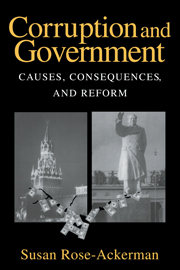Book contents
- Frontmatter
- Contents
- Preface
- 1 Introduction: The Costs of Corruption
- Part I Corruption as an Economic Problem
- Part II Corruption as a Cultural Problem
- Part III Corruption as a Political Problem
- 7 Corruption and Politics
- 8 Democracy and Corruption: Incentives and Reforms
- 9 Controlling Political Power
- Part IV Achieving Reform
- References
- Name Index
- Subject Index
9 - Controlling Political Power
Published online by Cambridge University Press: 05 June 2012
- Frontmatter
- Contents
- Preface
- 1 Introduction: The Costs of Corruption
- Part I Corruption as an Economic Problem
- Part II Corruption as a Cultural Problem
- Part III Corruption as a Political Problem
- 7 Corruption and Politics
- 8 Democracy and Corruption: Incentives and Reforms
- 9 Controlling Political Power
- Part IV Achieving Reform
- References
- Name Index
- Subject Index
Summary
Public accountability is necessary for the control of corruption. Both autocracies and democracies can be deeply corrupt, and each can be held accountable in different ways. Elections can constrain politicians, but, as we have seen, they are an imperfect tool. Public accountability is possible even in countries without elections or with a dominant party that always wins the vote. These constraints may be more difficult for autocrats to accept than for elected officials, but even democratic officials resist reforms that expose them to public scrutiny and criticism. Corruption can be limited both by internal government structures and organizations that constrain malfeasance and by outside pressure from the public.
Limits on the power of politicians and political institutions combined with independent monitoring and enforcement can be potent anticorruption strategies. In a democracy, these limits include the separation of powers between the legislative and executive branches. An independent judicial and prosecutorial system and a federal structure can limit the power of political leaders. But the fragmentation of political power is not necessarily effective. Under some conditions, a system with multiple veto points is particularly subject to improper influence, and a federal system may simply give state and local political leaders leeway to enrich themselves at public expense. Independent sources of prosecutorial and judicial power are less problematic, although, of course, these institutions must themselves be largely free of corruption and patronage. Independence is necessary but not sufficient.
- Type
- Chapter
- Information
- Corruption and GovernmentCauses, Consequences, and Reform, pp. 143 - 174Publisher: Cambridge University PressPrint publication year: 1999
- 1
- Cited by



